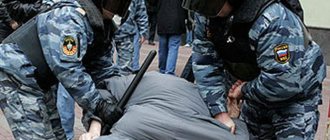1. Knowingly false information about an impending explosion, arson or other actions that create a danger of death of people, causing significant property damage or other socially dangerous consequences is punishable by a fine in the amount of up to two hundred thousand rubles or in the amount of the wages or other income of the convicted person for the period up to eighteen months, or compulsory labor for a term of up to four hundred eighty hours, or correctional labor for a term of one to two years, or restriction of freedom for a term of up to three years, or forced labor for a term of up to three years, or arrest for a term of three years up to six months, or imprisonment for up to three years.
2. The same act, which entailed the infliction of large damage or the onset of other grave consequences, is punishable by a fine in the amount of up to one million rubles or in the amount of the wages or other income of the convicted person for a period of eighteen months to three years, or by imprisonment for a term of up to five years. .
Note. In this article, major damage is defined as damage the amount of which exceeds one million rubles.
Non/criminal fakes
On April 1, 2022, two articles came into force in Russia providing for criminal liability for public dissemination of knowingly false information - Article 207.1 and Article 207.2 of the Criminal Code of the Russian Federation.
On April 21 and 30, 2022, the Presidium of the Supreme Court of the Russian Federation approved two reviews on certain issues of judicial practice, one of the sections of which is devoted to the issues of law enforcement of these new crimes (review No. 1: https://www.vsrf.ru/files/28856/ and review No. 2: https://www.vsrf.ru/documents/all/28882/).
For clarity, in order to distinguish the criminal public dissemination of knowingly false information from the dissemination of non-criminal information, we present the dispositions of these crimes (the sanctions of these articles, which provide for criminal penalties from a fine to imprisonment, are not of interest to us now).
Article 207.1 of the Criminal Code of the Russian Federation
Public dissemination, under the guise of reliable messages, of knowingly false information about circumstances that pose a threat to the life and safety of citizens, and (or) about measures taken to ensure the safety of the population and territories, methods and methods of protection from these circumstances -
Article 207.2 of the Criminal Code of the Russian Federation
- Public dissemination of knowingly false socially significant information under the guise of reliable messages, which through negligence resulted in harm to human health, -
_______________________________________
So, let’s determine the differences between a criminal fake [1] and a non-criminal one, taking into account their normative interpretation by the Supreme Court of the Russian Federation, based on the elements of these crimes, the absence of at least one of which excludes the criminality of the act as a whole (Article 8 of the Criminal Code of the Russian Federation).
- The object of crime is public safety. The subject of the crime is knowingly false information that threatens public safety.
Supreme Court of the Russian Federation: “For the purposes of Articles 207.1 and 207.2 of the Criminal Code of the Russian Federation, under knowingly false information, including about the circumstances of the spread of a new coronavirus infection (COVID-19) on the territory of the Russian Federation, and (or) about measures taken in connection with this to ensure security of the population and territories, methods and methods of protection from these circumstances, one should understand such information (information, messages, data, etc.) that initially does not correspond to reality, which was reliably known to the person who disseminated it .”
- The objective side of crimes is a socially dangerous act in the form of actions to spread fakes in certain ways. To incur criminal liability under Art. 207.2 of the Criminal Code of the Russian Federation also requires the occurrence of criminal consequences through negligence in the form of harm to a person’s health, or his death or other serious consequences, and a causal connection between these negative consequences and a widespread fake.
Supreme Court of the Russian Federation: “One of the mandatory conditions for liability under Article 207.1 or 207.2 of the Criminal Code of the Russian Federation is the dissemination of knowingly false information under the guise of reliable information . Making false information appear reliable can be evidenced, for example, by the forms, methods of its presentation (links to competent sources, statements of public figures, etc.), the use of forged documents, video and audio recordings, or documents and records related to other events .”
Supreme Court of the Russian Federation: “The dissemination of knowingly false information specified in the dispositions of Articles 207.1 and 207.2 of the Criminal Code of the Russian Federation should be recognized as public if such information is addressed to a group or an unlimited circle of persons and is expressed in any form accessible to them (for example, oral, written, using technical means).
The question of whether there is a sign of publicity in the dissemination of information must be resolved by the courts, taking into account the place, method, situation and other circumstances. It should be taken into account that the public nature of the dissemination of deliberately false information can be manifested in the use of the media, information and telecommunication networks, including instant messengers (WhatsApp, Viber and others), in the mass mailing of electronic messages to mobile subscribers, the dissemination of such information by speaking at a meeting, rally, distributing leaflets, hanging posters, etc.”
- The subject of crimes is an individual who has reached of sixteen (Article 20 of the Criminal Code of the Russian Federation). At the same time, criminal liability under Art. 207 of the Criminal Code of the Russian Federation for knowingly false information about an impending explosion, arson or other actions that create a danger of death, causing significant property damage or other socially dangerous consequences, committed out of hooligan motives, occurs from the age of fourteen .
Supreme Court of the Russian Federation: “Administrative liability for acts provided for in parts 10.1 and 10.2 of Article 13.15 of the Code of Administrative Offenses of the Russian Federation is established only for legal entities. Citizens, including officials, managers of a legal entity, if their actions constitute a crime under Article 207.1 or 207.2 of the Criminal Code of the Russian Federation, may be brought to criminal liability.”
- The subjective side of crimes is guilt in the form of direct intent. These crimes cannot be committed through negligence (if the person sending the fakes did not realize that he was unintentionally disseminating, under the guise of reliable information, false information that threatens public safety).
Supreme Court of the Russian Federation: “Posting by a person on the Internet or other information and telecommunications network, in particular, on his page or on the pages of other users, material containing false information (for example, video, audio, graphic or text) created by him or another person (including the so-called repost), can be qualified under Article 207.1 or 207.2 of the Criminal Code of the Russian Federation only in cases where it is established that the person acted with direct intent, was aware that the information he posted under the guise of reliable information was false , and had the purpose is to bring this information to the attention of others.”
Supreme Court of the Russian Federation: “The actions of an individual may contain signs of a criminal act and be qualified under Article 207.1 of the Criminal Code of the Russian Federation in cases where... such dissemination of knowingly false information, taking into account the conditions in which it is carried out, the purpose and motives of the actions taken (for example, in order to , in order to provoke panic among the population, violation of law and order), represents a real public danger and causes harm to relations protected by criminal law in the field of ensuring public safety.”
[1] Fake (English: fake) – fake, forgery, counterfeit. Counterfeiting, passing off as a real thing, changing the appearance or properties of objects. It can also mean fake news - an information hoax or the deliberate spread of misinformation on social media and traditional media. This phrase most often refers to sensational but deliberately false news reports.
False report of a terrorist attack: consequences
A citizen can only assess the severity of the unlawful act we are considering by focusing on such a designation as “knowingly false report.”
To put it simply, it is the fact that the criminal, reporting an allegedly impending crime, knows that nothing will actually happen, and determines the severity of the law governing this issue. The result of a knowingly false report about a planned act of terrorism is significant material damage caused to:
- as citizens of Russia in particular;
- and directly to the state.
Having received a message about the threat, police, firefighters and doctors go to the scene of the alleged incident, whose actions are aimed at preventing the consequences of the terrorist attack.
Based on a false message conveyed by a criminal to any official or representative of an organization against which the action of non-existent terrorists is directed, representatives of the following official structures are sent for certain purposes.
Table 1. Official structures traveling to the suspected site of a terrorist attack
ServicePurpose of departure
| Law enforcement | The purposes of the visit of representatives of the designated structure are the following actions: · checking the message for truthfulness; · neutralizing terrorists; · isolation of the territory; · preventing negative consequences of an incident, etc. |
| Fire service | Representatives of this structure have the main goal - to stop the fire caused by an explosion, burning, etc., if any occur, without allowing it to capture either the area indicated in the “terrorist’s” message or the adjacent territories. |
| Emergency | Ambulance is designed to help everyone who has suffered physically from a terrorist attack, as well as in cases where people simply feel ill, and in other similar situations. |
The damage caused by a false report will affect not only the health of those people who were in the place designated by the criminals, but also those citizens who did not receive help from government agencies occupied because of your joke
Not only does moving above the designated structures itself cost considerable resources from a material point of view, in addition, since any threat of a terrorist attack may turn out to be real, an evacuation of people is required, entailing:
- feeling of fear;
- feeling of total insecurity;
- discomfort, since the area is cordoned off in a hurry, and people taken away from it are often not allowed to leave.
All of the above components cause incredible emotional stress, which subsequently leads to a deterioration in the health of citizens against the backdrop of stress.
Art. 207. Criminal Code of the Russian Federation
In addition, it must be taken into account that law enforcement agencies always determine a plan of action in a designated situation, which is based on the existence of a real threat, and therefore during operations to prevent an incident:
- various checks are carried out;
- Urgent measures are taken to search for an explosive device, for example;
- measures are being taken to prevent negative consequences.
Thus, those government bodies that could focus on fulfilling the duties assigned to them by law, in the area of which there is a real need, are distracted and spend invaluable financial resources and human resources on preventing an imaginary threat, thereby causing irreparable damage to the entire country and its security in in general.
Law enforcement agencies are obliged to respond to your message immediately and move to the scene of the crime
Another comment on Art. 207 of the Criminal Code of the Russian Federation
1. The objective side of the crime consists in bringing to the attention of certain subjects false information about an impending terrorist act. Such a message can be expressed in any form (orally, in writing, using means of communication).
The addressees of the information are two categories of persons: a) bodies and organizations that, by the nature of their activities, must respond to such messages; b) organizations, institutions or individuals at the location of which a terrorist act is allegedly planned to be committed.
2. The crime is completed from the moment the addressee receives the corresponding message.
3. The subjective side of the crime in question is characterized by direct intent. A prerequisite for criminal liability is the awareness by the perpetrator of the falsity of the information he provides.
The acquittal
Article 207 of the Criminal Code of the Russian Federation does not consider cases in which:
- the person had fictitious information about the preparation of a terrorist act;
- the person did not have the intention to provide knowingly false information, because it was misled by another person.
In all of the above cases, a person is not liable in accordance with Article 207 of the Criminal Code of the Russian Federation, since this does not apply to knowingly false information.
Accordingly, if the person who committed the crime was misled, he will not be held accountable.
Reminder on knowingly false reports of an act of terrorism
Before sending the message in question to law enforcement agencies, read this memo. It will help you understand the real cost of the act being performed.
- Know that by making a bad joke like this, or sending a message about a terrorist attack, you are committing a number of crimes such as:
- attack on public safety;
- disruption of the normal activities of government agencies;
- wasting a significant amount of money and power resources of government agencies;
- causing harm to the interests and health of specific citizens.
2. Everything that is said by the informant or done in order to create the appearance of a planned terrorist attack constitutes a crime characterized as criminally punishable. The measures of responsibility applied to criminals in this case will be indicated by the Criminal Code of our country, namely, its Article No. 207.
- The motive of your action in the case of transmitting a false message about terrorism does not matter. It can be dictated:
- hooligan intentions;
- the desire to evaluate the performance characteristics of government bodies;
- the desire to achieve a useful personal goal, for which it is necessary to disrupt the work order for any organizations.
Often such jokes are spread by schoolchildren who will not bear responsibility for the act. In this case, their parents are responsible for everything
Remember, responsibility for committing the designated unlawful act begins at the age of 14; accordingly, even childhood will not be an argument for the court for refusing to impose a punishment commensurate with the act.
Existing penalties
For a knowingly false denunciation of an act of terrorism committed by a person or group of persons who have reached the age of fourteen, several types of punishment are provided, regulated by Article 207 of the Criminal Code of the Russian Federation, part 1 (as amended on February 19, 2022):
- fine up to 500 thousand rubles;
- correctional labor – no more than 3 years;
- arrest for up to 6 months;
- restriction of freedom – no more than 3 years.
If the offender has not reached the age of fourteen, all of the above penalties do not apply to him.
In accordance with Part 2 of Article 207 of the Criminal Code of the Russian Federation, the above act, which entails damage or destruction of property, is punishable:
- a fine of up to 700 thousand rubles;
- imprisonment - up to 5 years.
As a punishment for persons under the age of majority, sanctions may be applied in the form of expulsion from the educational institution in which the culprit is studying, as well as the imposition of responsibility on the parents of the culprit.
Punishment for a crime
Most often, people are interested in what threatens a person or group of people who commit a crime of this nature. The Criminal Code clearly outlines possible penalties and liability for knowingly false reports of acts of terrorism. All this is regulated by Article 207 of the Criminal Code of the Russian Federation. The law provides several options for punishing criminals. The specific preventive measure is chosen by court decision. Therefore, criminals who provide knowingly false information about an act of terrorism can be punished in the following ways:
- Obligation to pay a monetary fine. It amounts to a criminal’s monthly income for up to 1.5 years, or an amount not exceeding 200 thousand rubles.
- Public Works. The maximum duration of such work used as punishment for a crime is 480 hours.
- Correctional work. They are used quite regularly to prove the commission of a crime in the form of a knowingly false report of terrorism. The duration of correctional labor can be from 1 to 2 years.
- Forced types of work. If such a preventive measure is chosen, the offender is sent to work for a period of no more than 3 years.
- Restriction of freedom. If the court decided to restrict the freedom of a citizen who committed a crime under Article 207 of the Criminal Code of the Russian Federation, then the maximum term will be up to 3 years.
- Arrest. In case of such punishment, the accused may be arrested for 3–6 months.
- Deprivation of liberty. If the most severe punishment is chosen, the offender will face a prison term. According to Article 207 of the Criminal Code of the Russian Federation, false information about terrorism can be imprisoned for 3 years, but no more.
Everyone who was charged with the relevant charges will be held accountable. Any of the presented types of punishment can be applied to a citizen whose age is 14 years or older. If at the time of committing the crime the age of the accused has not reached the required level, then no type of punishment is applied to him. If a deliberately false message about acts of terrorism was disseminated by schoolchildren, students of higher education institutions and colleges, then expulsion from the educational institution may be applied as a punishment. This is relevant for individuals whose age at the time of committing the crime is 15 years or older.
It is important to make one note . If a crime is committed by a minor, that is, a teenager, then his parents will certainly bear responsibility for their child.
Cases of an offense
There are many examples in judicial practice when false denunciations about an impending terrorist act led to serious consequences:
- In 1995, in Rostov-on-Don, a man contacted the FSK department. He said that he would turn off two mines with which he plans to blow up a regular bus if he is paid 200 thousand rubles. As a result of illegal actions, the man was detained and faced a sentence of 4 years in prison. The motive in this case turned out to be a banal lack of material resources, and all activities were based on the desire to earn money. At the same time, more than 7 million rubles were spent on activities to search and detect explosives.
- In 1996, a man called a Voronezh hospital and reported explosives in the building. More than 100 patients were evacuated, including patients who were in serious condition. As a result, one person died and important operations were suspended.
- In the same 1996, the administration of Vnukovo-1 airport received a call reporting a bomb threat. Everyone inside the airport building was evacuated and flights were delayed.
Any case where there was a false report of an impending act of terrorism was accompanied by losses of various kinds.
In some cases, these losses were material, and in others, false denunciations led to the death of people. Therefore, it is difficult to disagree with the fact that this crime is quite dangerous for modern society.



